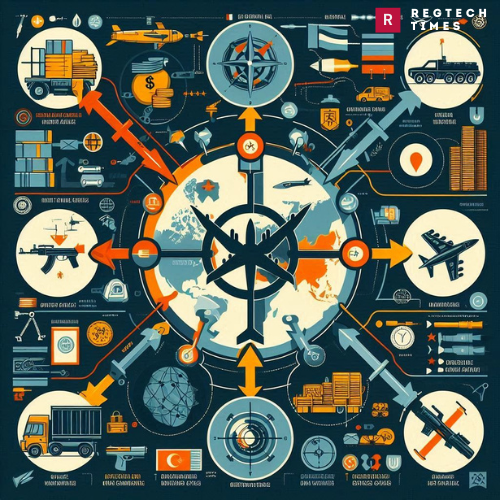A recent report from Amnesty International has shed light on a disturbing trend in Sudan: despite a mandatory United Nations Security Council (UNSC) arms embargo from 2004, weapons and military hardware continue to flow into the country. These weapons, sourced from countries like Russia, China, Turkey, and the UAE, are being diverted to the war-torn region of Darfur. The findings highlight the ineffective nature of the embargo and the ongoing suffering of civilians in Sudan.
According to the report, various armed groups and states use neighboring countries as supply lines to transfer weapons into and around Sudan. Amnesty International’s researchers found that small arms and ammunition, recently manufactured in countries like Serbia, Yemen, and China, are being used on the battlefield. This influx of weapons has exacerbated the conflict between the Sudanese Armed Forces (SAF) and the Rapid Support Forces (RSF), which erupted in April 2023.
The report’s co-author, Abdullahi Hassan, emphasized the failure of the UN embargo to protect civilians. He noted that once weapons reach Khartoum or other parts of Sudan, they are easily diverted to armed groups known for committing war crimes and crimes against humanity. This lack of control over weapon movement has made the situation in Darfur even more dire.
Widespread Use of Imported Weapons
Amnesty International analyzed 1,900 shipment records and around 2,000 verified photos and videos, interviewing 17 regional arms and Sudan experts. Their findings revealed that Russia is a significant supplier of weapons to Sudan, with their Tigr Designated Marksman Rifles (DMRs) being widely used by both the RSF and SAF. At least 1,500 Tigr DMRs were exported to Sudan after 2019, according to trade data.
The UAE also emerged as a prominent supplier of weapons and armored vehicles to the RSF, despite consistently denying accusations of arms supply. The report highlighted that all Emirati armored personnel carriers identified by Amnesty International were produced after 2004, indicating a likely violation of UN resolutions. The UAE, along with Turkey, China, and Serbia, are signatories to the Arms Trade Treaty (ATT), which obliges them to prevent the transfer of arms that would violate embargoes and eradicate illicit arms trade.
US Sanctions Intensify Russian Payment Issues with Its Allies China, Turkey and India
However, the evidence presented by Amnesty International shows that these obligations have been ignored. While declared arms imports into Sudan seemingly decreased after the outbreak of full-scale war, weapons continued to appear on the battlefield. This discrepancy suggests that arms are being supplied through unreported channels, with countries reluctant to report weapon transfers due to reputational and legal risks.
Humanitarian Impact of Sudan War
The humanitarian impact of the arms influx is severe. A report by Médecins Sans Frontières (MSF) documented the scale of civilian casualties from gunshot wounds, blast injuries, and shelling in Sudan’s conflict zones. In Al Nao hospital in Omdurman, 53% of over 6,700 patients admitted between mid-August 2023 and the end of April 2024 were treated for gunshot wounds, while 42% suffered injuries from shrapnel. In Darfur, the situation is even worse, with gun violence being rampant.
UAE’s Role as the Hub of Mercenaries in 21st Century Warfare
The Janjaweed militias, notorious for their role in the 2003 genocide, now operate under the RSF with complete impunity. On the Chad-Sudan border, MSF staff recorded a 20-fold increase in mortality rates among communities fleeing West Darfur since April 2023. The majority of these deaths were due to firearms, with 82% of the victims being men killed in ethnic violence.
Senator Elizabeth Warren Warns of Security Threats from Foreign Crypto Mining Operations
Women and girls have also been severely affected, with 62 women admitted for gunshot wounds and injuries from beatings, and 135 survivors of sexual violence treated by MSF teams in Chadian refugee camps between July and December 2023. Ninety percent of these survivors were abused by armed perpetrators.
The continuous influx of arms into Sudan has been a longstanding issue. Even in the chaos of war, the damage caused by armed violence is evident. The lack of transparency and control over weapon movements has only worsened the situation, leading to increased suffering for civilians.
UAE’s Falcon Shield Exercise Unveils Unexpected Chinese Espionage Threats for US
Efforts for Ceasefire and Peace Talks
In response to the escalating conflict, US Secretary of State Anthony Blinken has invited the SAF and RSF to a new round of ceasefire talks in Switzerland starting on August 14, 2024. This initiative follows several failed mediation attempts that have not secured a mechanism for humanitarian access or any respite in the fighting. The international community hopes that these talks will lead to a more sustainable ceasefire and alleviate the humanitarian crisis in Sudan.
Rebel Leaders Face US Sanctions Amid Kinshasa Court Trials
The ongoing conflict in Sudan highlights the devastating impact of unchecked arms flow and the failure of international embargoes to protect civilians. As the world watches, the need for effective measures to control weapon transfers and ensure accountability becomes increasingly urgent. The people of Sudan continue to suffer, and without decisive action, the cycle of violence and destruction is likely to persist.
The report by Amnesty International exposes the grim reality of the Sudan war, where international arms continue to fuel the conflict despite long-standing embargoes. The humanitarian impact is severe, with countless civilian casualties and widespread suffering. Efforts for peace and ceasefire continue, but the road to stability remains uncertain. The international community must take stronger measures to address the issue of illicit arms flow and ensure the protection of civilians in Sudan.


